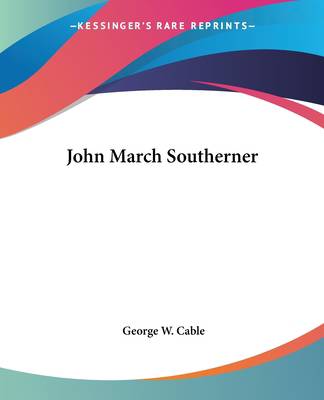
- Afhalen na 1 uur in een winkel met voorraad
- Gratis thuislevering in België vanaf € 30
- Ruim aanbod met 7 miljoen producten
- Afhalen na 1 uur in een winkel met voorraad
- Gratis thuislevering in België vanaf € 30
- Ruim aanbod met 7 miljoen producten
Zoeken
Omschrijving
""John March Southerner"" is a novel written by George W. Cable, first published in 1895. The story is set in New Orleans and follows the life of John March, a young man from a wealthy Southern family who becomes disillusioned with the Confederacy during the American Civil War. March joins the Union Army and fights against his own people, which causes him to be ostracized by his family and community.After the war, March returns to New Orleans and struggles to rebuild his life. He falls in love with a young woman named Jacqueline, but their relationship is complicated by the racial and social tensions of the time. March also becomes involved in politics and works to promote equality and justice for all people, regardless of their race or social status.Throughout the novel, Cable explores themes of identity, loyalty, and social justice. He paints a vivid picture of life in post-Civil War New Orleans, highlighting the struggle for racial equality and the challenges faced by those who dared to challenge the status quo. ""John March Southerner"" is a powerful and thought-provoking novel that offers a unique perspective on a pivotal moment in American history.""Oh, Mr. Ravenel; we can't. We just can't! It's the strangest thing in the world, sir! Nobody wants it but lumbermen, and to let them, faw a few cents an acre, sweep ove' it like worms ove' a cotton field--we just can't do it! Mr. Ravenel, what is the reason such a land as this can't be settled up? We'll sell it to any real settlehs! But, good Lawd! sir, where air they? Son an' me ain't got no money to impote 'em, sir. The darkies don't know anything but cotton fahmin'--they won't come. Let me tell you, sir, we've made the most flattering offers to capitalists to start this and that. But they all want to wait till we've got a good gov'ment. An' now, here we've got it--in Clearwateh, at least--an' you can see that these two men ain't satisfied!""This scarce antiquarian book is a facsimile reprint of the old original and may contain some imperfections such as library marks and notations. Because we believe this work is culturally important, we have made it available as part of our commitment for protecting, preserving, and promoting the world's literature in affordable, high quality, modern editions, that are true to their original work.
Specificaties
Betrokkenen
- Auteur(s):
- Uitgeverij:
Inhoud
- Aantal bladzijden:
- 380
- Taal:
- Engels
Eigenschappen
- Productcode (EAN):
- 9781419127823
- Verschijningsdatum:
- 17/06/2004
- Uitvoering:
- Paperback
- Formaat:
- Trade paperback (VS)
- Afmetingen:
- 193 mm x 234 mm
- Gewicht:
- 666 g

Alleen bij Standaard Boekhandel
+ 94 punten op je klantenkaart van Standaard Boekhandel
Beoordelingen
We publiceren alleen reviews die voldoen aan de voorwaarden voor reviews. Bekijk onze voorwaarden voor reviews.











